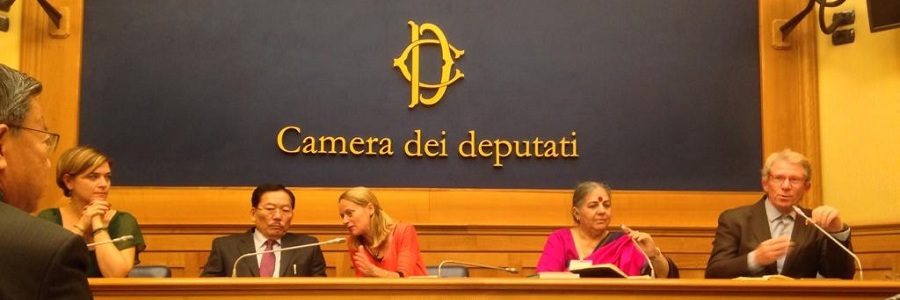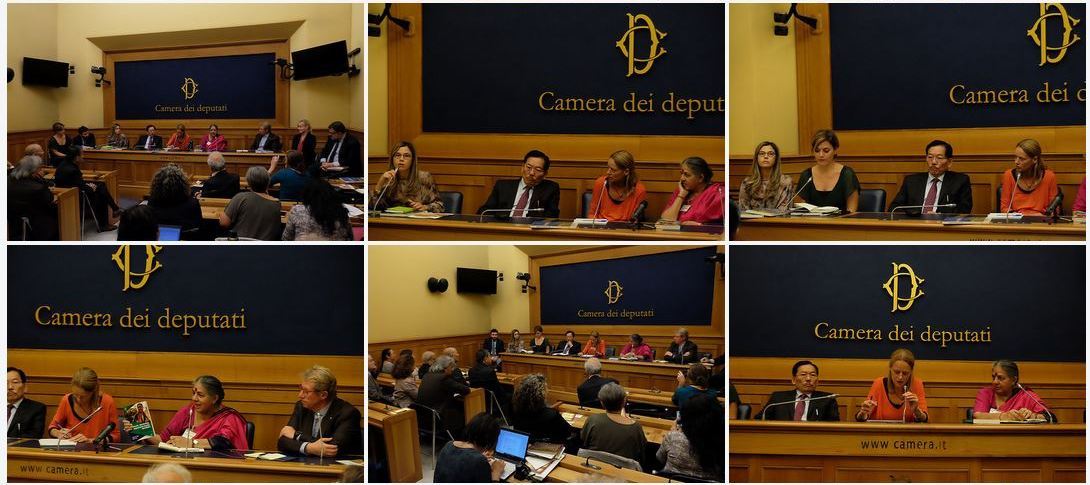
“Together, we have a different vision, which safeguards biodiversity, territories, farming communities, local economies, democracy, through a transition to an agrifood system that respects the land, the natural evolution of biodiversity and the dignity of people and cultures”, Dr Vandana Shiva.
On 15 October 2018, a press conference was held at the Italian Chamber of Deputies Press Room, with Pawan Kumar Chamling, Chief Minister of the Indian state of Sikkim, who converted 100% of his State’s agricultural production to organic farming, Vandana Shiva, President of Navdanya International and member of the executive committee of the World Future Council, together with Italian Parliamentarians: Hon. Rossella Muroni, LeU group leader in the Environment Committee, the president of the Montecitorio Agriculture Committee, Filippo Gallinella (M5S), Federico Fornaro, president of LeU and group leader of the Agriculture Committee, Maria Chiara Gadda, Pd group leader of the Agriculture Committee, Sara Cunial (M5S) and member of the Agriculture Committee, as well as Lucio Cavazzoni, former president of Alce Nero.
The Chief Minister of Sikkim is in Rome on the occasion of of the conferring of the prestigious Gold Future Policy Award to the State of Sikkim for the best global policies for agroecology, jointly presented by FAO, the World Future Council and IFOAM Organics International. The Indian Chief Minister commented: “Since the resolution was announced at the Legislative Assembly to convert the entire state to organic we have met with various resistance from the opposition and from the farmers themselves, but we have continued with determination. We are pleased that others want to take inspiration from our work, such as Kerala and other states in north-east India. To achieve these results we have always been at the forefront with various public policies, such as waste management, protection of forests, glaciers and climate, as well as education. You are curious to know our experience, but we also have a great interest in knowing other experiences in this field in other parts of the world. A 100% organic world is possible and there is no reason why farmers, communities and institutions should not continue to engage in this direction”.
Dr Vandana Shiva, also member of the Future Policy Award experts jury, commented on the success of the 100% organic conversion of Sikkim to which her organization, Navdanya, has actively contributed: “It is a well-deserved prize, but it is also a lighthouse for our future. The only possible future we have is to create a world free from dependence on fossil fuels, free from poisons and plastics, where healthy and biodiverse food is produced. We have destroyed our soils, created forced migrations from looted lands, which basic resources have been wiped-out, also because of the climate crisis. We are facing the sixth mass extinction of all living species, added to drought crises and floods all over the world. In addition, small farmers are abandoning their land, while our food system is creating a global health crisis. Despite this, false solutions are still being proposed with the same ideological paradigm that created the crises we are facing: for example, the vision of agriculture without farmers, fully digitized and controlled by large agrochemical companies, as well as new GMOs. It is a vision without a future. Together, we have a different vision, which safeguards biodiversity, territories, farming communities, local economies, democracy, through a transition to an agrifood system that respects the land, the natural evolution of biodiversity and the dignity of people and cultures.
The conference was moderated by Lucio Cavazzoni, former president of Alce Nero, who said: “It is possible to bring farmers back to many of our hills and mountains thanks to a widespread and capable network of people who love their territory. It is a new work that aims at the health of humankind and the planet. Organic is a hymn to life! Sikkim is not only the first 100% organic country, but for more than 10 years it has also created a transformation in the role of farmers and inthe role that healthy agriculture can play in addressing climate change”.
Sikkim’s organic model has received recognition and attracted the attention of Italian politicians, as confirmed by the presence of the President of the Agriculture Commission of Montecitorio, Filippo Gallinella (M5S): “Our commitment to safeguarding the environment concerns us all”. Maria Chiara Gadda, Group Leader of the Democratic party in the Agriculture Commission, then said: “We must combine the needs of modernity with sustainability, not only environmental but also social. Local rural economies can have a strong impact and change the way we produce and give back to agriculture that role of multifunctionality that it has always had. For example, in corporate social responsibility for social sustainability, for the dignity of work and disadvantaged people”.
Sustainable and organic agriculture is also essential for environmental sustainability. Rossella Muroni, LeU group leader in the Environment Commission, was present at the press room: “The sustainability of agricultural production is one of the most urgent and unavoidable recipes for tackling the challenge of climate change. At the same time, producing food in a fair, clean and just way is synonymous with social justice. Organic farming and Ecological Districts, as demonstrated by the experience of Sikkim, represent the future of agricultural production with territories and communities at the center of virtuous processes that combine work and environment”.
Hon. Sara Cunial (M5S) and member of the Agriculture Commission, underlined: “Today we are here with a revolutionary lesson. We can no longer waste time and too many compromises have already been made. The community has the right, but above all the duty, to start again from small farmers who are the guardians of the territory, of life and of seeds”.
Concluding, the Hon. Federico Fornaro, president of LeU and head of the Agriculture Commission declared: “There is a whole sector of agriculture that is suffering a lot, that of marginal areas, of the poor hills, and that could find an answer in organic farming. It would also be a response to the problem of climate change, to the occupation and depopulation of these territories, in which new generations of farmers could settle”.

The press conference at the Chamber of Deputies follows the International Biodiversity Congress, organized by Navdanya along with other International Partners including IFOAM, CISSA, Shumei, UNDP, German Cooperation and Regeneration International, and held in Dehradun, India, from 4 to 6 October. The Chief Minister of Sikkim and Dr Vandana Shiva, together with the women of Himalaya, have jointly announced a commitment for a Himalaya entirely organic and biodiverse, aimed at spreading the model that Sikkim has built over a period of 15 years, which has shown how a 100% organic agricultural model, based on the principles of agroecology and local circular economy, is not only possible, but also advantageous, as farms that practice organic and biodiverse farming are 20% more productive than those that practice monocultures with the use of chemical inputs. Navdanya has collaborated in the initiative to convert the whole country to organic farming, providing training to farmers and institutional managers of the agricultural sector.
The agroecological model is able to give life to a virtuous cycle between farmers, environment, territory and community, as well as the basis of joint commitment aimed at the global transition towards Poison-free Food and Farming by 2050.
The announcement of the initiative in favor of converting from the conventional agri-food system follows a series of recently collected data with respect to the greater profitability of organic farms and the growing interest of consumers in the sector, in addition to evidence of the negative effects of the current food production system on the environment and on health, as comprehensively demonstrated by the recent publication of Navdanya International, the Manifesto “Food for Health”, published by Terra Nuova Edizioni.
Also read:
A 100% organic world is possible. The Indian state of Sikkim shows us how
By Manlio Masucci, navdanya International – Lifegate, 14 november 2018
Celebrating Biodiversity with Navdanya
2 – 8 October 2018 – One week of events for the future of the Planet
Food for Health Campaign
The Health of the Planet and the People are one
